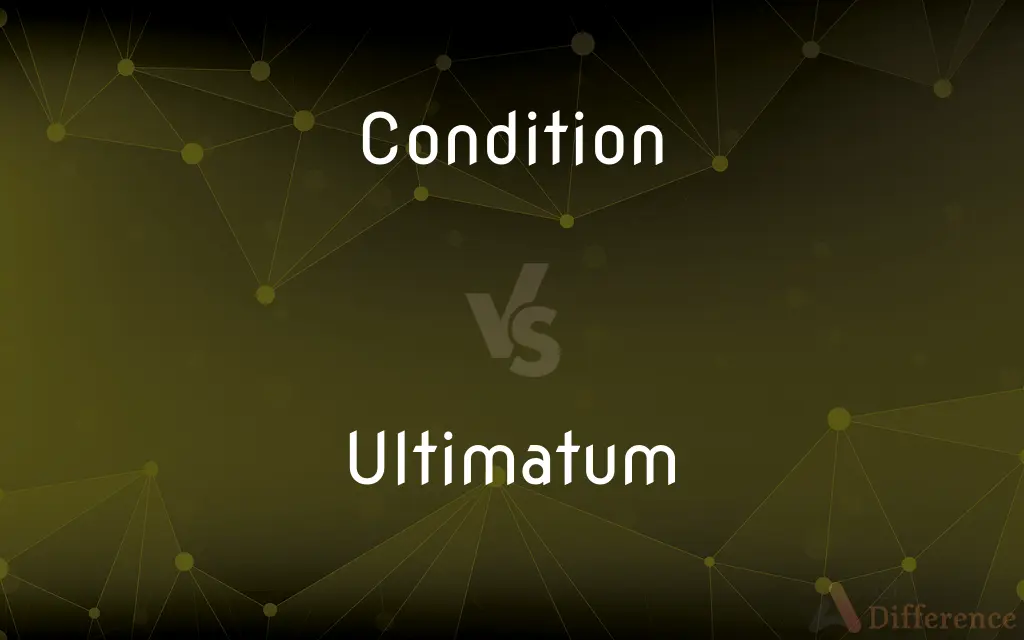Condition vs. Ultimatum — What's the Difference?

Difference Between Condition and Ultimatum
ADVERTISEMENT
Compare with Definitions
Condition
The state of something with regard to its appearance, quality, or working order
The wiring is in good condition
The bridge is in an extremely dangerous condition
Ultimatum
An ultimatum (; Latin for 'the last one') is a demand whose fulfillment is requested in a specified period of time and which is backed up by a threat to be followed through in case of noncompliance (open loop). An ultimatum is generally the final demand in a series of requests.
Condition
The circumstances or factors affecting the way in which people live or work, especially with regard to their well-being
Harsh working conditions
Ultimatum
A final offer or demand made by one party to another, especially in diplomatic negotiations, expressing or implying the threat of serious consequences or the breakoff of relations if the terms are not accepted.
Condition
A situation that must exist before something else is possible or permitted
All personnel should comply with this policy as a condition of employment
For a member to borrow money, three conditions have to be met
ADVERTISEMENT
Ultimatum
A final statement of terms or conditions made by one party to another, especially one that expresses a threat of reprisal or war.
Condition
Have a significant influence on or determine (the manner or outcome of something)
National choices are conditioned by the international political economy
Ultimatum
A final proposition, concession, or condition; especially, the final propositions, conditions, or terms, offered by either of the parties in a diplomatic negotiation; the most favorable terms that a negotiator can offer, the rejection of which usually puts an end to the hesitation.
Condition
Bring (something) into the desired state for use
A product for conditioning leather
Ultimatum
A final demand, the rejection of which may lead to a resort to force or other compelling action by the party presenting the ultimatum. In international diplomacy, an ultimatum may be used as by the demanding country as a signal to other countries that it gave the other country a seemingly reasonable opportunity to avoid a war; in this way, the demanding country may seek to avoid responsibility for starting a war.
Condition
Apply a conditioner to (the hair)
I condition my hair regularly
Ultimatum
A final peremptory demand
Condition
Set prior requirements on (something) before it can occur or be done
Congressmen have sought to limit and condition military and economic aid
Condition
A mode or state of being
We bought a used boat in excellent condition.
Condition
Conditions Existing circumstances
Economic conditions have improved. The news reported the latest weather conditions.
Condition
(Archaic) Social position; rank.
Condition
A state of health
Has the patient's condition deteriorated?.
Condition
A state of physical fitness
Have you exercised enough to get back into condition?.
Condition
A disease or physical ailment
A heart condition.
Condition
One that is indispensable to the appearance or occurrence of another; a prerequisite
Compatibility is a condition of a successful marriage.
Condition
One that restricts or modifies another; a qualification
I'll make you a promise but with one condition.
Condition
(Grammar) The dependent clause of a conditional sentence; protasis.
Condition
(Logic) A proposition on which another proposition depends; the antecedent of a conditional proposition.
Condition
A provision making the effect of a legal instrument contingent on the occurrence of an uncertain future event.
Condition
The event itself.
Condition
To make dependent on a condition or conditions
Use of the cabin is conditioned on your keeping it clean.
Condition
To stipulate as a condition
“He only conditioned that the marriage should not take place before his return” (Jane Austen).
Condition
To cause to be in a certain condition; shape or influence
“Our modern conceptions of historiography [are] conditioned by Western intellectual traditions” (Carol Meyers).
Condition
To accustom (oneself or another) to something; adapt
Had to condition herself to long hours of hard work.
Conditioned the troops to marches at high altitudes.
Condition
To render fit for work or use
Spent weeks conditioning the old car.
Condition
To improve the physical fitness of (the body, for example), as through repeated sessions of strenuous physical activity.
Condition
(Psychology) To cause (an organism) to respond in a specific manner to a previously unrelated stimulus, as in operant conditioning or classical conditioning.
Condition
To treat (the air in a room, for example) by air-conditioning.
Condition
To replace moisture or oils in (hair, for example) by use of a therapeutic product.
Condition
A logical clause or phrase that a conditional statement uses. The phrase can either be true or false.
Condition
A requirement or requisite.
Environmental protection is a condition for sustainability.
What other planets might have the right conditions for life?
The union had a dispute over sick time and other conditions of employment.
Condition
(law) A clause in a contract or agreement indicating that a certain contingency may modify the principal obligation in some way.
Condition
The health status of a medical patient.
My aunt couldn’t walk up the stairs in her condition.
Condition
A certain abnormal state of health; a malady or sickness.
Condition
The state or quality.
National reports on the condition of public education are dismal.
The condition of man can be classified as civilized or uncivilized.
Condition
A particular state of being.
Hypnosis is a peculiar condition of the nervous system.
Steps were taken to ameliorate the condition of slavery.
Security is defined as the condition of not being threatened.
Aging is a condition over which we are powerless.
Condition
(obsolete) The situation of a person or persons, particularly their social and/or economic class, rank.
A man of his condition has no place to make requests.
Condition
To subject to the process of acclimation.
I became conditioned to the absence of seasons in San Diego.
Condition
To subject to different conditions, especially as an exercise.
They were conditioning their shins in their karate class.
Condition
To make dependent on a condition to be fulfilled; to make conditional on.
Condition
(transitive) To place conditions or limitations upon.
Condition
To shape the behaviour of someone to do something.
The children were conditioned to speak up if they had any disagreements.
Condition
(transitive) To treat (the hair) with hair conditioner.
Condition
(transitive) To contract; to stipulate; to agree.
Condition
(transitive) To test or assay, as silk (to ascertain the proportion of moisture it contains).
Condition
To put under conditions; to require to pass a new examination or to make up a specified study, as a condition of remaining in one's class or in college.
To condition a student who has failed in some branch of study
Condition
To impose upon an object those relations or conditions without which knowledge and thought are alleged to be impossible.
Condition
Mode or state of being; state or situation with regard to external circumstances or influences, or to physical or mental integrity, health, strength, etc.; predicament; rank; position, estate.
I am in my conditionA prince, Miranda; I do think, a king.
And O, what man's condition can be worseThan his whom plenty starves and blessings curse?
The new conditions of life.
Condition
Essential quality; property; attribute.
It seemed to us a condition and property of divine powers and beings to be hidden and unseen to others.
Condition
Temperament; disposition; character.
The condition of a saint and the complexion of a devil.
Condition
That which must exist as the occasion or concomitant of something else; that which is requisite in order that something else should take effect; an essential qualification; stipulation; terms specified.
I had as lief take her dowry with this condition, to be whipped at the high cross every morning.
Many are apt to believe remission of sins, but they believe it without the condition of repentance.
Condition
A clause in a contract, or agreement, which has for its object to suspend, to defeat, or in some way to modify, the principal obligation; or, in case of a will, to suspend, revoke, or modify a devise or bequest. It is also the case of a future uncertain event, which may or may not happen, and on the occurrence or non-occurrence of which, the accomplishment, recission, or modification of an obligation or testamentary disposition is made to depend.
Condition
To make terms; to stipulate.
Pay me back my credit,And I'll condition with ye.
Condition
To impose upon an object those relations or conditions without which knowledge and thought are alleged to be impossible.
To think of a thing is to condition.
Condition
To invest with, or limit by, conditions; to burden or qualify by a condition; to impose or be imposed as the condition of.
Seas, that daily gain upon the shore,Have ebb and flow conditioning their march.
Condition
To contract; to stipulate; to agree.
It was conditioned between Saturn and Titan, that Saturn should put to death all his male children.
Condition
To put under conditions; to require to pass a new examination or to make up a specified study, as a condition of remaining in one's class or in college; as, to condition a student who has failed in some branch of study.
Condition
To test or assay, as silk (to ascertain the proportion of moisture it contains).
Condition
Train; acclimate.
Condition
A state at a particular time;
A condition (or state) of disrepair
The current status of the arms negotiations
Condition
A mode of being or form of existence of a person or thing;
The human condition
Condition
An assumption on which rests the validity or effect of something else
Condition
(usually plural) a statement of what is required as part of an agreement;
The contract set out the conditions of the lease
The terms of the treaty were generous
Condition
The state of (good) health (especially in the phrases `in condition' or `in shape' or `out of condition' or `out of shape')
Condition
Information that should be kept in mind when making a decision;
Another consideration is the time it would take
Condition
The procedure that is varied in order to estimate a variable's effect by comparison with a control condition
Condition
Establish a conditioned response
Condition
Train by instruction and practice; especially to teach self-control;
Parents must discipline their children
Is this dog trained?
Condition
Specify as a condition or requirement in a contract or agreement; make an express demand or provision in an agreement;
The will stipulates that she can live in the house for the rest of her life
The contract stipulates the dates of the payments
Condition
Put into a better state;
He conditions old cars
Condition
Apply conditioner to in order to make smooth and shiny;
I condition my hair after washing it
Share Your Discovery

Previous Comparison
Sap vs. Eat
Next Comparison
Hemp vs. Burlap













































